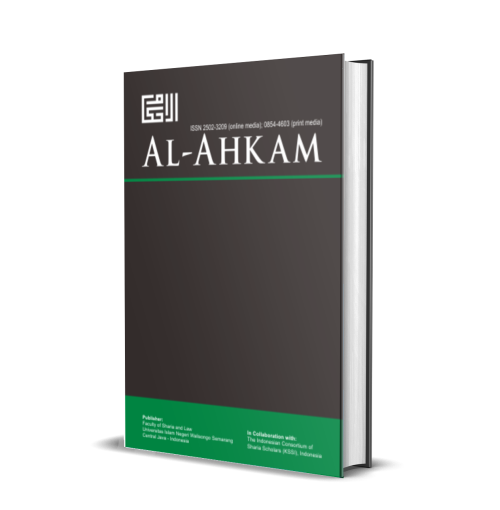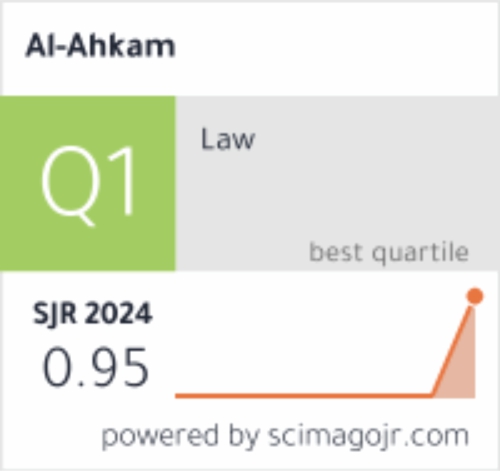KANUNISASI FIKIH JINAYAT KONTEMPORER Studi Materi Muatan Qānūn Jināyat Aceh dan Brunei Darussalam
DOI:
https://doi.org/10.21580/ahkam.2014.24.2.145Keywords:
kanun, fiqh jināyah, ḥudūd, jarīmah, pidana IslamAbstract
This article will view specifically codification of Islamic Criminal Law in `Muslim community, such as Brunei Darussalam, a country based on Islamic principles, and Aceh is a part of Indonesian territory administratively, granted special autonomy to implement Islamic Sharia. Despite having different qualities, -as a country and a province- both have in common as a political power which apply Islamic Criminal Law. Refer to both qānūn jināyat in Brunei and Aceh, the author’ll explain the substance of the criminal law in both area, while also reinforces the implementation of Islamic Criminal Law in the framework of a modern state. The article concludes that basically the application of Islamic Sharia, particularly the Islamic Criminal Law, is closely related to the situation and socio-political conditions of a community or country. The differences of political system, for example, has contributed to the difference in the output of product or policy made by a particular country or territory. On the other hand, Brunei and the Aceh case show that there has been adjustment Islamic Criminal Law specifically set forth in the books of fiqh (as illustration of the Qur'an and Sunnah) with the needs of the community itselfDownloads
References
Aceh Reglement, Staatblad 1881 No. 82.
Awdah, Abdul Qādir, Al-Tashrī’ al-Jinā’ī al-Islāmī: Muqāranah bi al-Qānūn al-Waḍ’ī, Beirut: Dār al-Kutub al-‘Arabī, t.th., juz I.
Baderin, Mashood, Hukum Internasional Hak Asasi Manusia dan Hukum Islam. Jakarta: Komnas HAM, 2010, edisi terjemahan.
Iskandar, T, Aceh dalam Lintasan Sejarah: Suatu Tinjauan Kebudayaan. Prasaran pada Seminar Kebudayaan dalam rangka PKA II dan Dies Natalis XI Universitas Syiah Kuala, 21 – 25 Agustus 1972 di Banda Aceh
Kanun Hukuman Jenayat, Perintah di Bawah Perkara 83 (3) tahun 2013.
Lembaga Pembinaan Hukum Nasional (LPHN), Pengaruh Agama Islam terhadap Hukum Pidana. Hasil Penelitian dalam Rangka Kerjasama LPHN dan Fakultas Hukum dan Pengetahuan Masyarakat Universitas Syah Kuala Darussalam, Banda Aceh, Tahun 1972.
Mahdi, “Sistem Hukum Penegakan Qanun Jinayat di Aceh”, dalam Media Syariah, Vol. XIII, No. 2, Juli – Desember 2011.
Mahmood, Taher, Personal Law in Islamic Countries. New Delhi: Academy of Law and Religion, 1987.
Mubarok, Acep Zoni Saeful, Hukum Keluarga Islam di Brunei Darussalam, dalam Atho’ Mudzhar dan Khoiruddin Nasution, ed., Hukum Keluarga di Dunia Islam Modern: Studi Perbandingan dan Keberanjakan UU Modern dari Kitab-kitab Fikih. Ciputat: Ciputat Press, 2003.
al-Naim, Abdullahi Ahmed, “Sharia in the Secular State: A Paradox of Sparation and Conflation”, dalam Peri Bearman, dkk., ed., The Law Applied: Contextualizing the Islamic Sharia. London & New York: IB Taurus, 2008.
al-Naim, Abdullahi Ahmed, Islam and the Secular State: Negotiating the Future of Shari’a. USA: Harvard University Press, 2008.
Qānūn jināyat Aceh Tahun 2014
Rahman, Ahmad Abdussalam Abdur, “Brunei Darussalam Negara Zikir: Hasrat Sultan Hasanah Bolkiah”, Artikel dipresentasikan dalam Annual Conference Islamic Studies (ACIS) ke-10, Banjarmasin, 1 – 4 November 2010.
Rahman, Pengiran Dato Seri Setia Dr. Haji Mohammad ibn Pangiran Haji Abd., “Kemasukan Islam ke Brunei Darussalam dan Undang-undangnya”, dalam Dato Seri Setia Haji Metussin ibn Haji Baki, ed., Sejarah Penubuhan Mahkamah Syariah Negara Brunei Darussalam. Brunei Darussalam: Jabatan
Kehakiman Negara Brunei Darussalam, 2005.
Salim, Arskal dan Azyumardi Azra, “Introduction: The State and Sharia in the Perspective of Indonesian Legal Politics”, dalam Arskal Salim dan Azyumardi Azra, ed., Sharia and Politics in Modern Indonesia. Singapura: Institute of Southeast Asia Studies, 2003.
Suaedi, Ahmad, dkk., ed., Islam, Konstitusi, dan Hak Asasi Manusia. Jakarta: The Wahid Institute, 2009.
Wasti, Tahir, The Application of Islamic Criminal Law in Pakistan: Sharia in Practice, Leiden and Boston: Brill, 2009.
Zahrah, Abū, al-‘Uqūbah: al-Jarīmah wa ’l-‘Uqūbah fī ’l-Islām, Kairo: Dār al-Fikr al-‘Arabī, tth.
Zahrah, Abū, al-Jarīmah wa ’l-‘Uqūbah fī ‘l-Fiqh al-Islāmī, Kairo: Dār al-Fikr al-‘Arabī, 1998.
Internet:
“Hukum Pidana Islam, DPR Aceh Sahkan Qanun Hukum Jinayat”, Kompas, 27 September 2014, diakses dari http://regional.kompas.com/read/2014/09/27/11445201/Hukum Pidana Islam, DPR Aceh Sahkan Qanun Hukum Jinayat.
Naga, Marsen S., “Hukum Jinayat di Aceh”, dalam Aceh Kita, 10 Desember 2009, diakses dari http://www.acehkita.com/2009/12/hukum-jinayah-di-aceh/
Downloads
Published
How to Cite
Issue
Section
License
By submitting an article to the journal, the author(s) agree to transfer the published article's copyright to the journal, which will act as the publisher. This means the journal will have the right to publish the article in various forms, including reprints. The journal will maintain the publishing rights to the published articles.
In line with the license, authors and third parties (readers, researchers, and others) are allowed to share and adapt the material. In addition, the material must be given appropriate credit, provided with a link to the license, and indicated if changes were made. If authors remix, transform or build upon the material, authors must distribute their contributions under the same license as the original.




